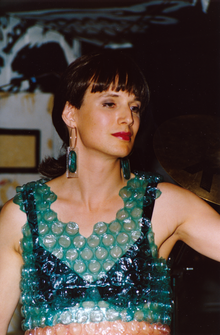|
Chris Korda
Chris Korda (born 1962)[1] is an American artist, electronic musician, software developer, and environmental activist, best known as the leader of the Church of Euthanasia. Korda's work combines provocative performance art with political and environmental activism, challenging societal norms and advocating for sustainable living. Early life and educationChris Korda was born in 1962 in New York City into a family with a intellectual and artistic background. Korda is the daughter of Michael Korda and his first wife, Carolyn Keese. [2] She is the granddaughter of art director Vincent Korda, and the great-niece of film directors Alexander Korda and Zoltan Korda. She is a graduate of the Hammonasset School. CareerArtistic workIn 1992, Korda founded the Church of Euthanasia, a satirical religious organization advocating for population reduction through non-traditional methods, including abortion, cannibalism, and sodomy. The Church's slogan, "Save the Planet, Kill Yourself," garnered significant media attention and sparked controversy. Korda used this platform to raise awareness about overpopulation and environmental degradation. In 1995, Korda, together with Lydia Eccles, launched the campaign Unabomber for President. This campaign took the form of a political action committee, Unabomber Political Action Committee (UNAPACK). The group supported the arguments set forth in the Unabomber Manifesto, but not Ted Kaczynski himself. The Church of Euthanasia's activities often involved performance art, including provocative demonstrations and multimedia presentations.[3] The music video "I Like To Watch", which was published on the website of the Church of Euthanasia after the terrorist attacks on September 11, 2001, provoked massive criticism. It combined footage from the coverage of the attacks with excerpts from pornographic films and sporting events.[4] In 2022, the "Le Confort Moderne" main gallery showed a retrospective of Korda's work.[5] Artforum magazine wrote about the exhibition: "The cumulative effect of these pieces, ... is to sow doubt. Korda, ... excels at appropriating the very language and tools of political populism and evangelism that are prevalent across mass media and culture."[6] Frieze Magazine reviewed the exhibition and wrote: "Korda's primary aim is to raise awareness about the environmental crisis and the need for radical solutions. Her secondary aim, ..., is to revitalize human creativity through collaboration with machines. She explores this project as a software developer, creating programs designed to generate forms and music exceeding human capacities."[7] In 2024, Korda's work was featured in an exhibition titled "Artist's Con(tra)ception" at the Kölnischer Kunstverein in Germany. This exhibition showcased the depth of Korda's artistic contributions, presenting her blend of art, activism, and performance.[8] Musical workKorda's musical career is deeply intertwined with her activism. Korda began experimenting with electronic music in the late 1980s, using synthesizers and computer software to create innovative soundscapes. As an electronic/techno musician, Korda has released several LPs, singles, and EPs. Notable albums include Six Billion Humans Can't Be Wrong (1999), The Man of the Future (2003), and Akoko Ajeji (2019). Korda toured Europe with the album The Man of the Future, released in 2003 by the German electronic music record label International Deejay Gigolo Records. Korda has performed at numerous electronic music festivals and events worldwide, including the Sonar Music Festival in Barcelona in 2001. Korda's live performances often feature the use of her own software.[9] Software developmentIn addition to her artistic and musical endeavors, Korda is a software developer. In 2008, Korda designed Fractice, a fractal renderer.[10] She is also the inventor of music software such as Waveshop (2013), a bit-perfect lossless free audio editor,[11] and ChordEase (2014), a free software tool that simplifies playing notes on any MIDI instrument. ChordEase was presented at the 2015 International Conference on New Interfaces for Musical Expression.[12] Artistic style and techniquesKorda's artistic style is characterized by a blend of performance art, electronic music, and software development. Technologically adept, Korda frequently incorporates custom software and advanced production techniques into her music. The provocative and often controversial nature of Korda's work challenges societal norms and encourages critical thinking about environmental and political issues.[13] Personal LifeKorda is transgender and has been open about her gender identity.[14][15] Reception and LegacyKorda's work has been both celebrated[16] and criticized[17] for its unorthodox approach and provocative messaging. While some view Korda as a visionary artist and activist, others see the methods employed by the Church of Euthanasia as extreme and controversial.[18][19] Selected discographyAlbums
Singles and EPs
Bibliography
External links
References
|
||||||||||||||||||
